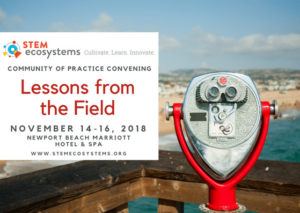‘Lessons from the Field’ set for Nov. 14 to Nov. 16 in Orange County
(Newport Beach, CA) – Leaders from Kenya, Mexico and Israel are coming to Orange County Nov. 14 to Nov. 16 to learn from the work of the STEM Learning Ecosystem Community of Practice, one of the world’s first successful models of global cooperation in STEM education.
The international education leaders will join 350 of their American counterparts in a three-day conference devoted to sharing best practices in STEM education.
With sessions ranging from how to bring STEM education to pre-schoolers to how to engage tomorrow’s world leaders, the STEM Learning Ecosystem Community of Practice (SLECOP) has planned “Lessons from the Field,” its bi-annual convening, for Orange County Nov. 14 to Nov. 16. This is a fitting location, as it is the site of the first-ever STEM Learning Ecosystem, OC STEM, which was developed with the support of the Samueli Foundation.
The event, expected to draw worldwide leaders from education, business, government, non-profit organizations and philanthropy, features hands-on learning opportunities coupled with presentations from nationally recognized experts in the field of STEM learning and engagement.
“Lessons from the Field” is an opportunity for the 68 ecosystems that make up the STEM Learning Ecosystem Community of Practice to gather for acquiring strategies to improve education in science, technology, engineering and math (STEM) that will enable students to thrive in a world dominated by ever-changing technologies.
Numerous companies and organizations recognize the value of the work of the SLECOP and are sponsoring it, including LEGO, National Inventors Hall of Fame and STEM Premier.
Janice S. Morrison, president and founder of TIES, the educational consultancy that operates the STEM Learning Ecosystem Community of Practice, said the work of the SLECOP is grounded in an understanding that jobs in STEM careers are growing rapidly and that the national average wage for STEM-related occupations is nearly double that of non-STEM careers.
“The SLECOP is a unique model for international collaboration. Individuals from different cities, regions, states and nations come together to learn from one another and to work to create a world of better opportunity for the next generation through STEM education,” Morrison said. “The learning and the engagement doesn’t stop when the convening ends. What we’ve built is a movement of thousands of people who believe in the power of STEM to transform lives. They work with each other and learn from one another throughout the year.”
STEM Learning Ecosystems build strong collaborations in schools and beyond the classroom—in afterschool and summer programs, at home, with local business and industry partners, and in science centers, libraries and other places – both virtual and physical. Ecosystems strive to enable students to connect what they learn at home, in school and out-of-school with real-world opportunities.
Learn more about the national initiative at stemecosystems.org. Address specific questions to info@stemecosystems.org. Join online conversations on Twitter @STEMecosystems and #STEMecosystems and on Facebook.
About the STEM Funders Network: The STEM Funders Network brings together grantmakers working in STEM to learn from one another, leverage their collective resources and collaborate on high-impact projects they could not undertake alone. The vision of the STEM Funders Network is that all U.S. students should have equal opportunity to engage in high-quality STEM learning experiences that will enhance their ability to succeed in a STEM career or other chosen path. See http://www.stemfundersnetwork.org



